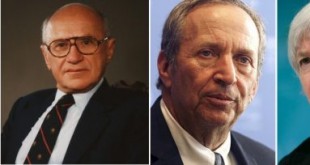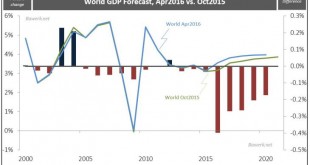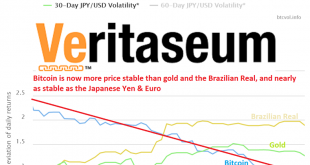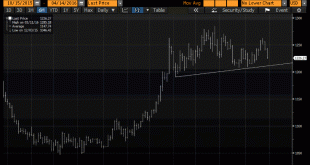At the IMF/World Bank meetings this week, Chinese officials are again pushing for greater use of the IMF’s unit of account, Special Drawing Rights. It is China’s turn as the rotating host of the G20, which gives it greater influence over its agenda. For its part, the IMF is concerned about global financial stability and must be open-minded. It wants to strengthen the financial system. It is only prudent to examine all reform ideas. Last September, the IMF agreed to include the yuan...
Read More »Weekly Emerging Markets: What has Changed
Bank Indonesia will use the 7-day reverse repo rate as its new benchmark policy rate The ruling party in South Korea unexpectedly lost parliamentary elections The Monetary Authority of Singapore eased monetary policy to recession settings Turkey has nominated its next central bank chief The Brazilian special lower house committee voted 38-27 in favor of impeachment The first round of Peru’s presidential election was inconclusive In the EM equity space, Brazil (+5.4%), UAE (+4.9%), and...
Read More »Why All Central Planning Is Doomed to Fail
Positivist Delusions [ed. note: this article was originally published on March 5 2013 – Bill Bonner was on his way to his ranch in Argentina, so here is a classic from the archives] We’re still thinking about how so many smart people came to believe things that aren’t true. Krugman, Stiglitz, Friedman, Summers, Bernanke, Yellen – all seem to have a simpleton’s view of how the world works. A bunch of famous people with a simpleton view of how the world works…who not only seriously think...
Read More »Circulus in probando
In the latest semi-annual Keynesian incantation spewed out by the world’s best pseudo-scientists, we learn that growth has been too slow for too long and that in itself is the cause of slow growth. First, they promote debt-funded consumption because spending – money supply/credit and velocity – is equivalent to nominal GDP growth, and as long as you have nominal GDP growth you can always add more debt to the existing stock ad infinitum. That obviously came crashing down in 2008. At that...
Read More »FX Daily, 04/15: Better Chinese Data Fails to Deter Pre-Weekend Profit-Taking
China’s slew of economic data lends credence to ideas that the world’s second-largest economy may be stabilizing. However, the data failed to have a wider impact on the global capital markets, including supporting Chinese equities. In fact, the seven-day advance in the MSCI Asia-Pacific Index was snapped with a fractional loss today. European shares are also lower on profit-taking, breaking a five-day advance. Commodities, including oil, copper, nickel and zinc are also trading off....
Read More »BOE and Brexit
No one can feign surprise that the Bank of England kept policy steady. Nor was the 9-0 vote truly surprising, though there had been some speculation of a couple of dovish dissents. Nevertheless, there are two important takeaways for investors. First, the BOE recognized what many in the market have already accepted; namely that the economy has lost some momentum. Growth for Q1 is estimated at 0.4%, which represents a some moderation. Over the past four quarters, the UK has averaged...
Read More »A Take On How Negative Interest Rates Hurt Banks That You Will Not See Anywhere Else
The Bank of Japan and the ECB are assisting me in teaching the world’s savers, banking clients and corporations about the benefits of blockchain-based finance for the masses. How? Today, the Wall Street Journal published “Negative Rates: How One Swiss Bank Learned to Live in a Subzero World“: Alternative Bank Schweiz AG late last year became Switzerland’s first bank to comprehensively pass along negative rates to all of its customers. Violating an almost religious precept in the financial...
Read More »Great Graphic: Is that a Head and Shoulders Top in Gold?
This Great Graphic, created on Bloomberg shows the price of gold over the last six months. The price peaked a month ago near $1285. It seems a distribution top is being formed. Specifically, it looks like a potential head and shoulders top. The left shoulder was formed by the spike on February 11, which also marked the bottom of many equity markets. The head was formed in the first half of March. The right shoulder was put set earlier this week. To be sure, the neckline has...
Read More »FX Daily, 04/14: Greenback Steadies Against Majors, but Firmer vs EM After MAS Surprise
After initially extending its recent recovery gains against the major currencies, the US dollar began consolidating in the European morning. An unexpected shift by the Monetary Authority of Singapore, replacing a modest and gradual currency appreciation with a more neutral stance, coupled with softer oil prices and weaker European equities, appears to have weighed on emerging market currencies. Asian equities extended their rally, with the Nikkei gaining 3.25% and the Shanghai Composite...
Read More »Who Lends to the Fed?
Recently, I wrote to argue against the populist idea that the Federal Reserve prints money. I say populist because it’s not supported by economic or banking theory, and it is not accurate in describing Fed practice in the market. It used to stir up emotion against the Fed. The Fed causes a lot of harm, but we should stick to the facts. I argued that the Fed does not print; it borrows. I illustrated this point with a series of examples of borrowing, starting with a homeowner who takes a...
Read More » Swiss Economicblogs.org
Swiss Economicblogs.org










